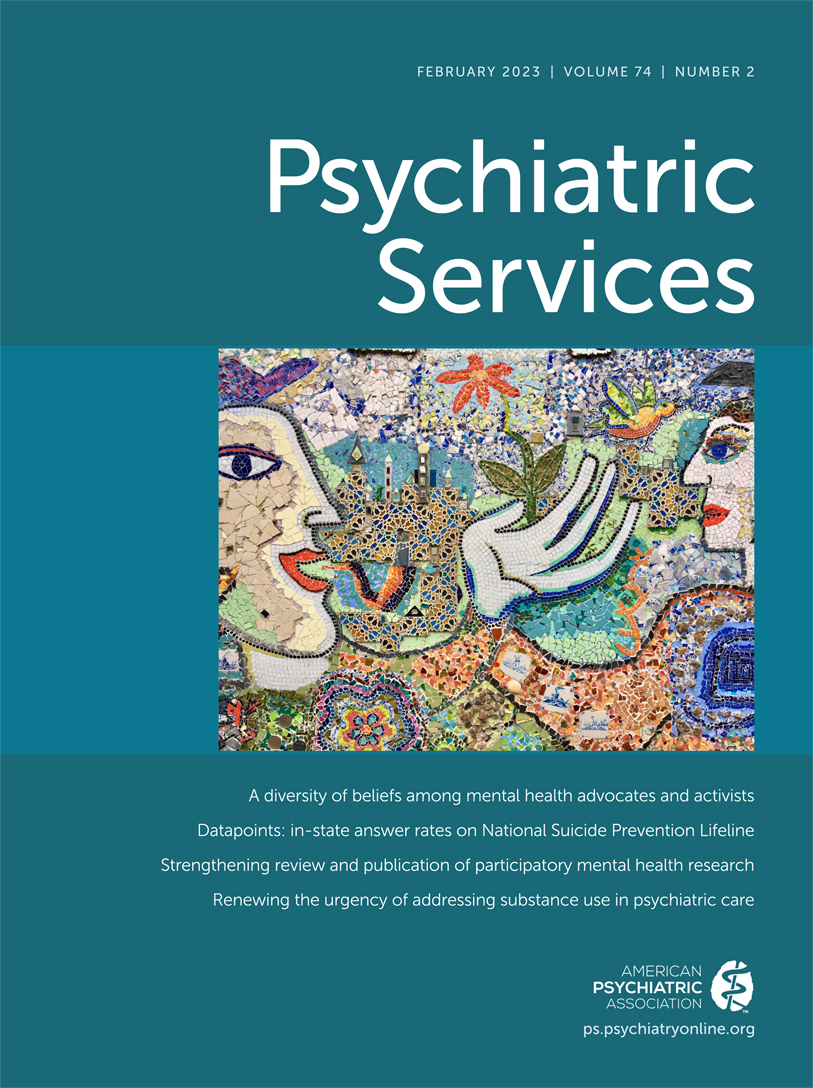The Cultural Formulation Interview: Building the Case for Cultural Competence in Clinical Care
TO THE EDITOR: Cultural competence initiatives are recommended for clinicians to reduce ethnoracial disparities in mental health care; however, most of these initiatives lack evidence of improving service or illness outcomes (1). Building an evidence base for their impact may increase uptake among clinicians and administrators.
We piloted the Cultural Formulation Interview–Engagement Aid (CFI-EA) in a hospital-based community mental health clinic in New York City from 2017 to 2018. The CFI-EA guides clinicians on incorporating information obtained from the “core” CFI, a standardized approach for individual cultural assessment, into treatment planning (2). The trial tested treatment adherence among 36 outpatients randomly assigned to CFI-EA (N=18) or to usual treatment (N=18). Ninety-four percent of patients and 67% of clinicians were Black, Indigenous, or people of color; nearly all dyads were cross-ethnoracial (e.g., South Asian clinician, Black patient).
Across treatment arms, after the first appointment we compared scores on three subscales and an item on patient’s trust in provider from the Cultural Competence item set of the Consumer Assessment of Healthcare Providers and Systems 2.0 (CAHPS) (3) (see online supplement). Higher scores on the three subscales indicate worse experiences, and higher scores on patient trust in provider indicate greater trust.
Scores for the CAHPS subscales patient-provider communication, experiences of discrimination, and experiences leading to trust or distrust did not differ significantly across treatment arms. Patients’ mean±SD ratings of trust in their provider (on a scale of 0 to 10, with higher scores indicating greater trust) were significantly higher for CFI-EA (8.7±1.2) than for usual treatment (7.1±2.7) (t=2.32, df=23.99, p=0.029; Glass’s δ=0.60). Patients’ overall trust rating may capture aspects of provider trust that are not captured in the five items comprising the experiences leading to trust or distrust subscale.
Overall, trust in one’s provider is associated with greater retention in psychological treatment, and mistrust may lower retention in ethnoracially diverse clinical dyads (4). Enhanced cultural competence may improve patient-provider trust, a component of therapeutic alliance associated with engagement (5). However, our sample size was underpowered to detect significant differences: with the observed scores, the patient-provider communications subscale would need a sample of at least N=78, and experiences leading to trust or distrust would need at least N=326 to reach statistical significance (there were no observed differences on the experiences of discrimination items). An additional limitation was the use of an older version the CAHPS (2.0), which was current during our pilot study. The cultural competence items drawn from this older version are not in CAHPS version 3.0. Future research can examine CFI-EA’s specific impact in larger samples to test its efficacy as an approach for enhancing provider cultural competence.
1. : Cultural competency training for psychiatry residents and mental health professionals: a systematic review. Int J Soc Psychiatry 2021; 67:833–839Crossref, Medline, Google Scholar
2. : Implementing the Cultural Formulation Interview in a community clinic to improve appointment retention: a pilot study. Psychiatr Serv 2022; 73:227–230Link, Google Scholar
3. CAHPS Clinician & Group Surveys and Instructions: About the CAHPS Cultural Competence Item Set. Rockville, MD, 2012. https://www.ahrq.gov/sites/default/files/wysiwyg/cahps/surveys-guidance/survey4.0-docs/2312_about_cultural_comp.pdf. Accessed Oct 22, 2021 Google Scholar
4. : Geriatric mental health clinicians’ perceptions of barriers and contributors to retention of older minorities in treatment. Clin Gerontol 2005; 28:3–25 Crossref, Google Scholar
5. : Systematic review and meta-analysis of therapeutic alliance, engagement, and outcome in psychological therapies for psychosis. Psychol Psychother 2021; 94:822–853Crossref, Medline, Google Scholar



